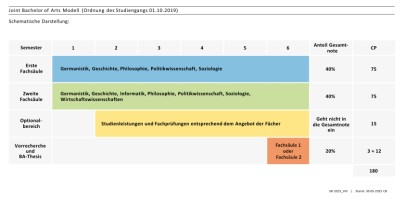Digital Philology
Bachelor of Arts (als Joint Bachelor of Arts in den Fächern X und Y); tuition language: German and English
The following English language content is for information purposes only. The legally binding content can be found on the corresponding German website.
Description
The Bachelor of Arts programme in the special form of Joint Bachelor of Arts in Subjects X and Y allows to combine two different subjects/components.
The component Digital Philology offers a combination of competencies from the established philological branches linguistics and literary studies on the one hand and theories and methods of digitally processing texts on the other.
If the Bachelor’s Thesis (15 CP) is written in the J.B.A. component Digital Philology, it may be composed in German or English without prior application. The Thesis may be written in the areas of focus Corpus Linguisitics or Computer Philology.
Module Handbook (opens in new tab)
Study Regulation of Joint Bachelor of Arts in the Subjects X and Y
Semester Course and Examination Schedule
Institute for Linguistics and Literature
Is the programme right for you? Find out!
Possible from (almost) everywhere:
Online Self-Assessment for selecting a course of study
Podcast “fuTUre students”
Kann ich MINT?
Come and see, touch and feel, meet and greet:
hobit: Hochschul- und Berufsinformationstage in Darmstadt (orientation event)
University visits, labs, internships, and more
Orientation after enrolment:
Orientation programme “navigatING”
(for the programmes B.Sc. Bauingenieurwesen, B.Sc. Elektrotechnik und Informationstechnik; B.Sc. Maschinenbau – Sustainable Engineering; B.Sc. Umweltingenieurwissenschaften)
Perspectives on careers:
Career guidings with the #studentsofTUdarmstadt
TU Darmstadt Career Service
| Semesters | 6 |
| Language |
German and English. Language requirement: Proof of proficiency in English on C1 (GER) level; required documents. |
| Start of Studies | winter semester |
| Internship | optional career-oriented internship |
| Admission requirements | Formal and language requirements for applicants with international qualifications; |
| Application | Application deadlines and online application . |
| Good to know |
Costs and budget einfachsTUdieren : Pre-Courses, getting started Preparatory courses for international students Minimum requirements by the end of the second semester Study Abroad Part-time studies TU Darmstadt Career Service Alumni careers |



